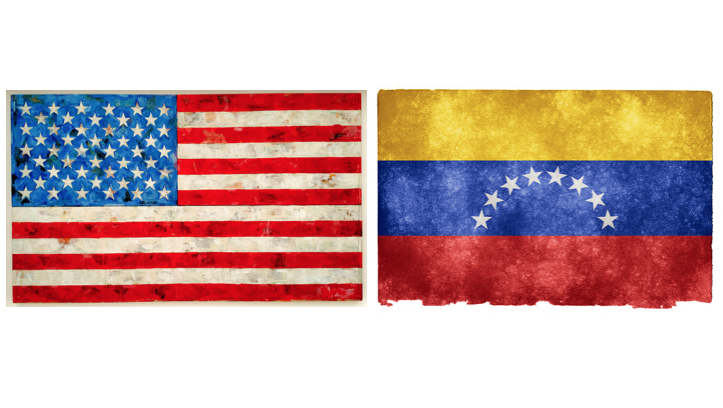On July 4 and 5, the United States and Venezuela celebrated, a few hours apart from each other, their national holidays. They were sad anniversaries for both countries.
For Venezuela it was rather a day of mourning. It began with the depressing images of Vice President Tareck El Aissami, entering arrogantly into the National Assembly, accompanied by the Minister of Defense and Head of the Armed Forces, General Vladimiro Padrino López, by cabinet members, and by Chavez supporters; according to El Aissami, to commemorate Venezuela´s Independence. Actually, he disrespected the parliamentary hall, trampling once again on the independence of powers.
El Aissami had also summoned to the National Assembly «those excluded by the capitalist model and by this stateless political class»; an invitation that was followed literally by a group of armed criminals, who entered the Assembly with clubs and other weapons; dirtied, with the brutality of violence, a place that should be sacred and respected, because it is the symbol of democracy; wounded several deputies; and intimidated and robbed those inside, including journalists and officials. Venezuela will hardly celebrate an Anniversary of Independence bitterer than the one it came to live on July 5, 2017.
The day before, despite the beauty of the fireworks that filled the skies with colors and the air with jubilant exclamations of adults and children, the celebration of Independence was no more joyful for Americans.
The uncertainty that fills the homes of Americans has many causes. The twits that the President publishes in the spur of the moment, to insult right and left, particularly the press, generate worry and wonder; scaring is his determination to dismantle not only the health reform that favored millions of people of low resources, but diverse social programs of which many of his electors have benefited until now. Measures such as cutting back on scientific research, closing borders to immigrants, threatening a wall with which to alienate Mexico and Mexicans, create deep concern. When all of humanity lives under the threat of terrorism and global warming, a president like Trump does not offer much peace of mind. Withdrawing The United States from the Paris Agreements is considered a dangerous decision by most citizens; and the same goes for the gradual disarticulation of the energy plans implemented by President Obama, which prohibited extractions in coastal areas, and new fossil energy exploitations.
Added to the above is a risky foreign policy that almost never respects the delicate rules of diplomacy. There are many headaches, ranging from relations with Europe to the complex reality of the Middle East; divisions between Sunnis and Scientists; civil war in Syria; Turkey’s grave situation, where Erdogan regularly tramples on all human rights. As far as our region is concerned, we went from the wall with Mexico to the reestablishment of the blockade of Cuba and, in general, show lack of interest in the countries of the region. To top it all off, there are Kim Yong-un’s war games of launching missiles as if they were toys, on account of his feeling protected by the assurances provided by China’s and Russia’s economic interests.
In general terms, the United States is losing economic power, and the image of a country that carried the banners of tolerance, democracy, freedom of the press and expression, and values such as peace and democracy, is becoming blurred.
Trump began his first G20 with a visit to Poland, ruled by a far-right populist and authoritarian right-wing, a sure ally, with whom he wanted to send a clear message to Merkel’s and Macron’s Europe. Then, without any concern for the shadows that continue to cloud the past election campaign, because of Russian interference in computer systems, he held with Putin a meeting that lasted more than two hours, despite it having been scheduled to last 35-40 minutes. As if they had been great friends, forgetting that a few hours before in Warsaw he had said that «Russia has a destabilizing attitude, we will know how to respond», Trump sat down in front of a smiling and very confident Putin, to talk about Syria and Ukraine, immigration and terrorism, and finally, computer security.
When Putin said, with a smile, that there had been no Russian interference in the American elections, denying FBI’s, CIA’s and NSA’s allegations, and those words were repeated by Secretary of State Tillerson, we could not help but compare the cynicism of the Russian leader with that of Nicolás Maduro, who condemned the violent acts that bloodied the Venezuelan National Assembly.
Both countries are suffering the consequences of elections marked by many errors: from those of the opposition parties to those of the voters, who expressed their dissatisfaction with abstention.
Perhaps we should all read Timothy Snyder’s book On Tyranny, which lists the things that must be done to restore humanity to societies and to avoid the pitfalls of populism.
Snyder ends with a recommendation not to accept the policy of inevitability. Other Anniversaries will come.
Photo Credits: Nicolas Raymond; Thad Zajdowicz


